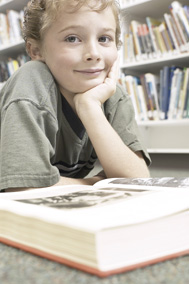Visit http://www.ala.org/bbooks/frequentlychallengedbooks for lists of frequently challenged books by year.

And Tango Makes Three by Justin Richardson and Peter Parnell
The children's book And Tango Makes Three is based on a true story of two male penguins who hatch and raise a chick at New York City's Central Park Zoo. Since its publication, the book has been challenged in elementary and public libraries. It was among the top five most frequently challenged books of the 2000s.
Activity: Start a discussion about the meaning of family with the resources in this educator's guide for And Tango Makes Three, a true story about a nontraditional family of penguins. This printable includes several research topics for studying zoo animals and learning more about penguins.

A Light in the Attic by Shel Silverstein
This collection of poems by Shel Silverstein was among the 100 most frequently challenged books of the 1990s. It was censored for "suggestive illustrations" and encouraging bad behavior.
Activity: Let this printable guide to the world of Shel Silverstein help you find online, classroom, or library resources for works by Shel Silverstein. This is an excellent resource for Shel Silverstein games, activities, event kits, and more for Poetry Month, Banned Books Week, or anytime of year.

Bridge to Terabithia by Katherine Paterson
The Bridge to Terabithia by Katherine Paterson was among the top ten most frequently challenged books of the 1990s and remained in the top 100 most frequently challenged books from 2000-2009. Reasons cited for censorship include the use of profanity and inappropriate subject matter. In the story, a child deals with the death of his friend.
Activity: Promote discussion and critical thinking before, during, and after reading Bridge to Terabithia by Katherine Paterson with the resources in this teacher's guide.

The Giving Tree by Shel Silverstein
This children's story about a boy and an apple tree was banned because it was perceived to be "sexist".
Activity: Read the story aloud, discuss its meaning, and make a giving tree in your classroom.

The Goosebumps Series by R.L. Stine
The Goosebumps series by R.L. Stine was among the top 100 most frequently banned books of the 1990s and 2000s. It has faced censorship challenges for being too violent and scary.

The Harry Potter Series by J.K. Rowling
Since it became popular, the Harry Potter series has been among the most frequently challenged books. Parents, libraries, schools and churches have censored the works claiming they encourage wizardry and sorcery. The series includes Harry Potter and the Philosopher's Stone, Harry Potter and the Chamber of Secrets, Harry Potter and the Prisoner of Azkaban, Harry Potter and the Goblet of Fire, Harry Potter and the Order of the Phoenix, Harry Potter and the Half-Blood Prince, and Harry Potter and the Deathly Hallows.
Activity: Use these lesson plans and activities to get in on the fun for any of the Harry Potter books.

How to Eat Fried Worms by Thomas Rockwell
How to Eat Fried Worms by Thomas Rockwell was banned for encouraging inappropriate behavior.
Activity: These enrichment activities for How to Eat Fried Worms include a character chart, project ideas, a word find, and comprehension tests.

James and the Giant Peach by Roald Dahl
One of the top 100 most frequently challenged books of the 1990s, Roald Dahl's beloved James and the Giant Peach has been banned for racism, being too scary, mysticism, and a variety of other charges.
Activity: These Roald Dahl Teaching Resources include enrichment activities for James and the Giant Peach and a teacher's guide to the world of Roald Dahl.

Little House on the Prairie by Laura Ingalls Wilder
In the 1990s, Little House on the Prairie was banned from some classrooms because they considered the historical perspectives on race offensive.
Activity: This classroom activity guide to the Little House books includes discussion questions and classroom activities for each book, plus thematic and interdisciplinary connections.

The Lorax by Dr. Seuss
The Lorax by Dr. Seuss was censored by some schools and libraries for criticizing the foresting industry.
Activity: This classroom activity for The Lorax is a great way to teach students about resource use. Read The Lorax aloud, discuss the story, then show the class products that illustrate reduced resource consumption. Students will learn how overconsumption by humans can negatively impact the environment.

Where the Sidewalk Ends by Shel Silverstein
Where the Sidewalk Ends by Shel Silverstein was banned by some school districts over fears that it "promotes drug use, the occult, suicide, death, violence, disrespect for truth, disrespect for authority, and rebellion against parents."
Activity: In this poetry lesson plan, students read Shel Silverstein's famous poem "Sarah Cynthia Sylvia Stout Would Not Take the Garbage Out" and identify the rhyme. Then, they write a poem about their chosen state using the same rhyme pattern.

The Witches by Roald Dahl
One of many censored works by Roald Dahl, The Witches was among the top 25 most frequently challenged books of the 1990s for its portrayal of women, witchcraft, and violence.
Activity: Have students create their own silly stories with this Mad-Lib type activity for The Witches by Roald Dahl.





